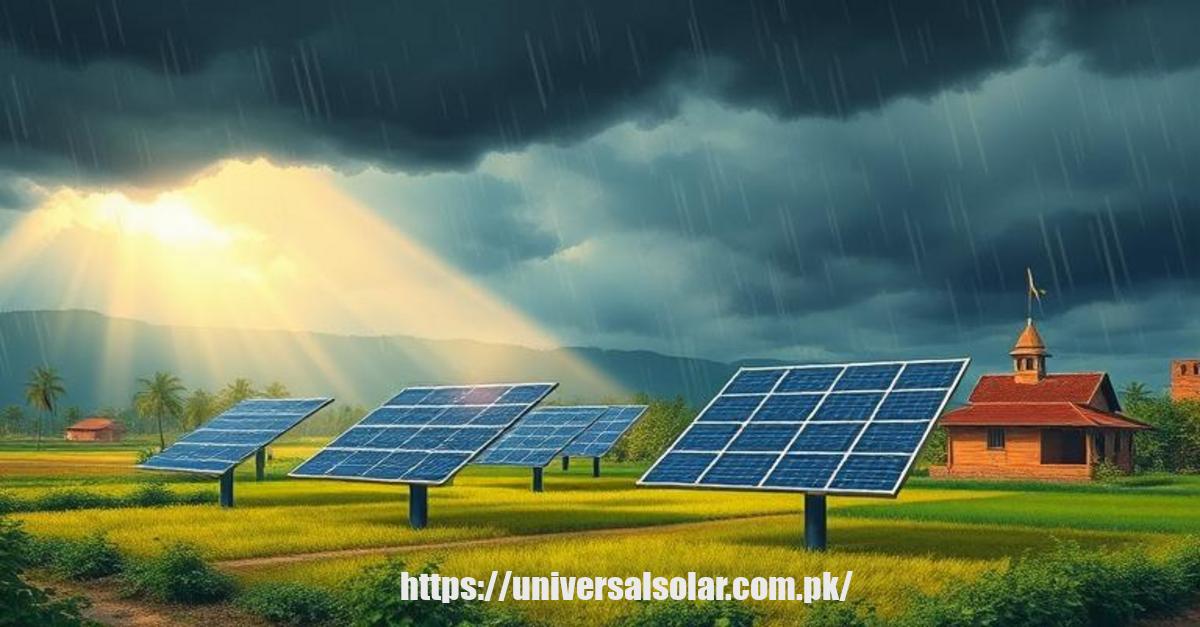The performance of solar systems in Pakistan is significantly influenced by the monsoon season. Understanding how the monsoon impacts solar production is crucial for optimizing energy output and ensuring a reliable power supply. This blog post explores the challenges and opportunities for solar energy production in Pakistan during the monsoon season, providing insights for homeowners, businesses, and policymakers.
The challenges presented by the monsoon season require careful planning and maintenance to ensure that your solar system continues to function optimally. For further information about renewable energy solutions, visit the International Renewable Energy Agency (IRENA) for comprehensive insights into solar technologies and global initiatives.
Navigating the Monsoon: Solar Challenges in Pakistan
The arrival of the monsoon season in Pakistan brings with it a familiar set of challenges for solar energy systems. Heavy rainfall, persistent cloud cover, and elevated humidity levels can all conspire to reduce the efficiency of solar panels and decrease overall energy yields. Let’s take a closer look at these specific hurdles:
The Shadow of Reduced Sunlight
Perhaps the most obvious obstacle is the increased cloud cover. Dense clouds act as a barrier, blocking direct sunlight and significantly diminishing the amount of solar radiation reaching the panels, directly impacting production.
The Grime Factor: Panel Soiling
The monsoon rains, while providing much-needed water, also carry dust and debris. This can lead to a build-up of grime on the surface of solar panels, creating a layer that further reduces the amount of light absorbed and hindering production.
The Dampening Effect: High Humidity
Increased humidity can lead to condensation forming on the panels, which can negatively impact their performance. Moreover, humid conditions create an ideal environment for mold and mildew growth, potentially causing long-term damage to the solar system.
Weather’s Wrath: Physical Damage
Severe weather events, such as strong winds and hailstorms, can pose a direct threat to solar panels. These conditions can cause physical damage, reducing their lifespan and overall efficiency.
Strategies for Maximizing Solar Energy Production During the Monsoon
Despite these challenges, proactive measures can be taken to minimize the monsoon’s impact on solar production:
The Power of Clean: Regular Cleaning
Consistent cleaning of solar panels is crucial to remove accumulated dust and debris. This simple step ensures that the panels receive the maximum possible sunlight, boosting production.
Angle Advantage: Panel Angle Optimization
Adjusting the angle of the solar panels can help optimize sunlight capture, even when skies are overcast. Experimenting with different angles can improve energy yields during cloudy periods.
Reflectivity Boost: Anti-Reflective Coatings
Applying anti-reflective coatings to the panels can enhance their ability to absorb light, even under low-light conditions, thus maximizing production.
Power in Reserve: Battery Storage Systems
Installing battery storage systems allows you to store excess energy generated during sunny periods. This stored energy can then be used when sunlight is limited, ensuring a consistent power supply.
Vigilant Oversight: Monitoring and Maintenance
Regular monitoring and maintenance are essential for identifying and addressing any issues that could negatively affect the performance of the solar system.
Solar System Maintenance During Monsoon Season in Pakistan: A Checklist
Maintaining a solar system during the monsoon season requires a keen eye for detail. Here’s a quick maintenance checklist:
- Check Wiring and Connections: Ensure all wiring and connections are secure and protected from moisture to prevent electrical issues.
- Inspect Panels for Damage: Regularly inspect the panels for any signs of physical damage, such as cracks or chips, caused by severe weather.
- Clean Panels Regularly: Clean the panels every few weeks to remove dust and debris that accumulate during the rainy season.
- Monitor System Performance: Keep a close watch on the system’s performance to detect any drops in energy production early on.
Government Initiatives Fueling Solar Energy in Pakistan
The government of Pakistan is actively encouraging the adoption of solar energy through a range of initiatives:
Net Metering: Sell Your Surplus
Net metering programs enable homeowners and businesses to sell excess solar energy back to the grid, providing a financial incentive for solar adoption.
Financial Aid: Tax Incentives
Tax incentives and subsidies are available to help reduce the initial cost of installing solar systems, making them more accessible.
Spreading the Word: Awareness Campaigns
The government is investing in awareness campaigns to educate the public about the numerous benefits of solar energy.
Powering the Future: Solar Parks
Large-scale solar parks are being developed across the country to significantly increase overall solar energy capacity and production.
The Economic Upsides of Solar Energy
Investing in solar energy offers significant economic benefits, especially in a country like Pakistan:
Bye-Bye Bills: Reduced Electricity Bills
Solar energy can dramatically reduce or even eliminate electricity bills, resulting in substantial savings for homeowners and businesses.
Energy Independence: Taking Control
Solar energy reduces reliance on fossil fuels and imported energy sources, enhancing energy security and independence for Pakistan.
Creating Opportunities: Job Creation
The solar industry is a job creator, generating employment opportunities in manufacturing, installation, and ongoing maintenance.
A Greener Future: Environmental Benefits
Solar energy is a clean, renewable energy source that reduces carbon emissions and helps combat climate change, contributing to a healthier environment.
Future Prospects for Solar Production in Pakistan: A Bright Horizon
The future of solar production in Pakistan is looking increasingly bright. With ongoing technological advancements and decreasing costs, solar energy is becoming more accessible and affordable. Supported by government policies and growing public awareness, solar energy has the potential to become a major contributor to Pakistan‘s energy landscape.
Cost Analysis of Solar System in Pakistan: Key Factors
Several factors influence the overall cost of solar systems in Pakistan:
- System Size and Capacity: Naturally, larger systems with higher capacity will have a higher initial cost.
- Component Quality: Opting for higher-quality panels, inverters, and batteries will increase the upfront cost but will result in better long-term performance and durability.
- Installation Costs: Installation charges can vary depending on the complexity of the installation process and the specific location.
- Government Incentives: Taking advantage of available subsidies and tax credits can significantly offset the initial investment.
Below is a table summarizing the factors influencing solar production:
| Factor | Impact on Solar Production | Mitigation Strategies |
|---|---|---|
| Cloud Cover | Reduces sunlight reaching panels | Optimize panel angles, use battery storage |
| Panel Soiling | Decreases light absorption | Regular cleaning of panels |
| High Humidity | Affects panel performance | Anti-reflective coatings, proper ventilation |
| Weather Damage | Physical damage to panels | Regular inspection and maintenance |
| Government Initiatives | Boosts solar adoption | Utilize net metering and tax incentives |
Solar Systems and Climate Change: A Sustainable Solution
Using solar energy offers significant advantages in reducing carbon emissions and mitigating the effects of climate change. Pakistan‘s commitment to solar helps contribute to global climate goals.
Conclusion: Embracing a Solar-Powered Future for Pakistan
Solar energy presents a compelling solution to Pakistan‘s energy challenges, providing a clean, reliable, and cost-effective source of power. While the monsoon season does pose challenges, these can be effectively managed through strategic planning, regular maintenance, and supportive government policies. By embracing solar energy, Pakistan can pave the way towards a more sustainable and energy-independent future.
RELATED: GST on Solar Panels in Pakistan

